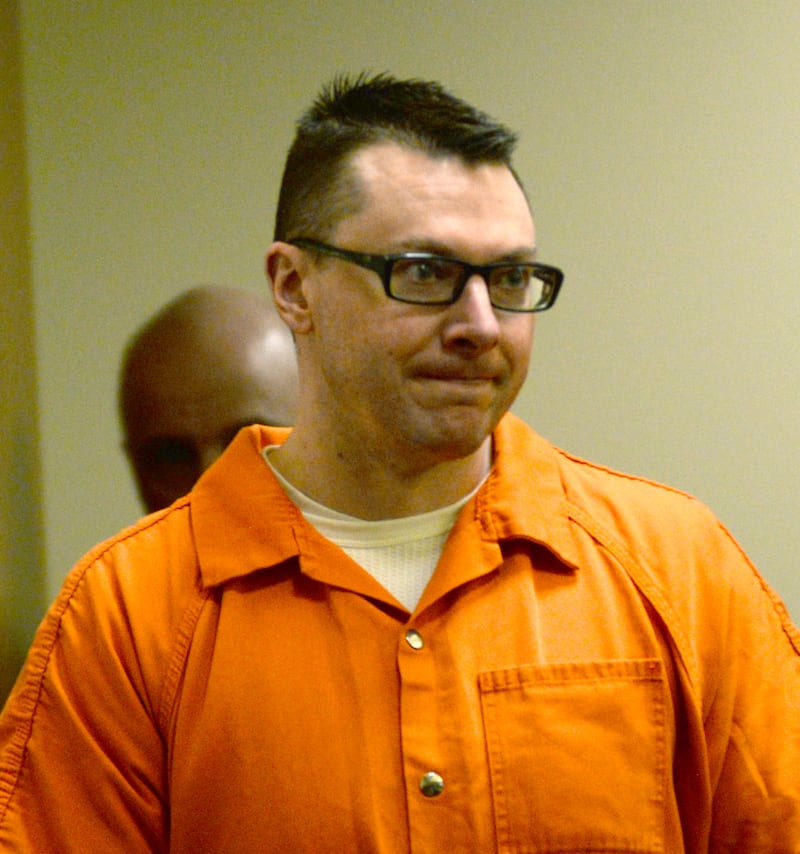OREGON – An Ogle County judge has denied a defense motion to move a first-degree murder trial out of the county.
Judge John “Ben” Roe announced his decision Wednesday, April 23, during a short hearing at the Ogle County Judicial Center.
“I have considered all the evidence, motions and arguments,” Roe said. “At this time, the proper way is for this to be assessed during voir dire.”
Voir dire is a Latin phrase meaning “to speak the truth” that is used to describe the process where potential jurors are asked questions by attorneys and the judge before being selected to serve as jurors.
Duane Meyer, 43, of Stillman Valley, is charged with four counts of first-degree murder, two counts of aggravated arson and one count of concealment of a homicidal death in connection with an Oct. 19, 2016, Byron house fire in which Meyer’s ex-wife, Margaret “Maggie” (Rosko) Meyer, 31, was found dead.
The couple’s 3-year-old son, Amos Meyer, who also was home at the time of the fire, was later pronounced dead at a Rockford hospital.
Meyer has pleaded not guilty to all of the charges and has been held in the Ogle County Jail since his arrest Oct. 9, 2019.
Meyer’s attorney, Christopher DeRango of Rockford, filed a motion in January to move the trial out of Ogle County, just three weeks before the jury trial was scheduled to start Feb. 3 and expected to take the entire month.
In his “change of place of trial,” motion, DeRango argued that because of “heavy” media coverage of Meyer’s numerous pretrial hearings since 2016, Meyer “cannot obtain a fair trial in Ogle County, Illinois.” He also has claimed that derogatory comments on social media pages about his client are prejudicial.
A change of venue motion typically asks the judge to move the trial to a different location. Those motions usually cite reasons that the filing party believes would prevent a fair trial in the county in which the case was filed. Pretrial publicity often is listed as a reason for a change of venue motion.
A change of venue survey is one of the tools that can be used by defense attorneys before filing a motion for a change of venue.
DeRango said a survey, paid for by Meyer’s parents, asked Ogle County residents from December through January about the case. In that survey, DeRango said 34% of respondents recalled the fire and 59% had formed an opinion regarding the defendant’s guilt. He did not say how many people responded to the survey.
But Ogle County State’s Attorney Michael Rock and his assistants argued against the change of venue, calling the survey “flawed” and arguing that the trial should stay in Ogle County.
They argued that Meyer “will absolutely receive a fair trial” and that just because someone is aware of a pending case does not mean they have formed an opinion as to innocence or guilt.
Assistant State’s Attorney Allison Huntley said pretrial publicity was primarily updates about the case as it moved through the court system.
And, she argued, potential jurors could be eliminated during voir dire. She said there was no evidence that the pretrial publicity in the Meyer case was so pervasive and prejudiced that juror responses to voir dire questions concerning potential bias would be unreliable.
Huntley said pretrial publicity is to be expected in cases of such magnitude, and only 184 residents had been questioned in the survey commissioned by the defense – less than 1% of the county’s total population.
At a December hearing, DeRango said the company conducting the survey had to “adjust their methods” because of Ogle County’s smaller population size.
DeRango argued that the results of the survey indicated a “reasonable apprehension” that Meyer cannot get a fair trial in Ogle County.
On Wednesday, Roe asked Assistant State’s Attorney Matthew Leisten and DeRango to start considering dates for a new trial date.
“Start looking at your calendars for trial dates, considering the estimate of how long the trial will take,” Roe told the attorneys.
He remanded Meyer to the Ogle County Jail and set the next hearing for 2 p.m. May 14.
Maggie Meyer was a teacher at the Chana Education Center at the time of her death. She filed for divorce in 2014, and court records show the divorce was finalized in September 2016.
Prosecutors have argued that their evidence will show Duane Meyer planned to end Maggie’s life.
In previous hearings, DeRango and prosecutors have said numerous cellphone records and data will be part of the evidence presented.
DeRango also has argued that text messages sent by Duane Meyer before the deaths were only part of a “contentious” divorce and not indicative of anything nefarious. Prosecutors disagree.

:quality(70)/author-service-images-prod-us-east-1.publishing.aws.arc.pub/shawmedia/c70d24f0-1332-4244-8446-e91288029474.jpg)